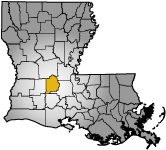NCIC SECURITY POLICY
RESCIND: FEBRUARY 15, 2023
EFFECTIVE: JUNE 26, 2025
SECURITY POLICY
PURPOSE
To ensure the proper documentation. Protection, dissemination, and destruction of Criminal Justice Information, including LAACH/NCIC criminal history, and personally identifiable information until the information is release to the public via authorized dissemination (e.g., with a court system, presented in crime reports data, released in the interests of public safety); purged, or destroyed in accordance with applicable records retention rules. This policy is intended to supplement the CJIS Security Policy.
POLICY
It is the policy of the Evangeline Parish Sheriff's Office to use criminal justice information, criminal histories, and personally identifiable information in accordance with CJIS Security Policy, Louisiana Law, and Federal Law. Criminal histories and criminal justice information shall only be used for authorized purposes. Persons violating this policy may be subject to administrative, civil, and/or criminal penalties.
PROCEDURE
CRIMINAL JUST INFORMATION (CJI)
Information obtained from the CJI systems, must only be used for authorized criminal justice or noncriminal justice purposes as allowed by federal or state law. Personnel must follow all CJIS Security Policy, state and federal rules and regulations regarding CJI information. All Personnel with access to CJI, shall receive the proper training within 90 days of hire or within 90 days from requiring the need to access such data.
Dissemination of CJI containing criminal history is only permitted to authorized personnel, after validating the requested as an employee and/or contractor of a law enforcement agency or civil agency requiring the CJI to perform their mission or a member of the public receiving CJI via authorized dissemination.
Access to physical and digital media in all forms is restricted to authorized individuals only.
Access to technology systems providing access to electronic media is for authorized individuals only and requires and account established according to policy.
Physical media (i.e., documents) shall only be store for case file and validation purposes. When not in use the documents will be stored in a physically secure area in cabinets preventing viewing or access by visitors or unauthorized personnel. Documents will only be removed from filing cabinets when needed for operational purposes, and will not be left out where they can be viewed by visitors or unauthorized personnel.
All servers containing CJI shall be maintained in a physically secured building inaccessible to non-authorized individuals. All entrances to the building shall be locked and only accessible to agency employees. Any servers outside of a physically secure location shall be encrypted. Any documents shall be secured in the records division with access to only authorized personnel. When documents containing CJI are physically removed, the individual shall sign for the documents in the dissemination log maintained the Communications Division.
Physical media that contains CJI data that needs to be transported to another location shall be sealed in an envelope and given directly to its final destination by authorized personnel only, where it will be handed over to an authorized individual. No additional stops are permitted during the transportation of CJI data.
All computer screens will be orientated to prevent unauthorized viewing or "shoulder surfing".
CJI shall not be transmitted via email.
CJI transmitted as a facsimile via a single or multi-function device over a standard telephone line is exempt from encryption requirements. CJI transmitted external to a physically secure location using a facsimile server, application, or service which implements email-like technology shall meet the agency encryption requirements.
Physical media (print-outs and other hardcopy physical media) that contains CJI data shall be disposed of according to the agency physical media destruction policy.
CRIMINAL HISTORY
The following procedure will be followed with respect to Criminal History:
A criminal history log will be kept in the CAD. This log will trace criminal history requests, their dissemination, and also function as a secondary dissemination log. These logs will be maintained for five (5) years as require by FBI guidelines.
Any person accessing a criminal history will provide the following information for placement in the criminal history log.
- Date of access to information
- The name of the individual whose criminal history was run
- To whom the information was release
- Who released the information?
- The State Identification (SID) and/or FBI numbers
- The purpose for which the information was requested
- Case number
The information above will be used to validate the requester is an authorized recipient of the criminal history.
Any criminal histories released outside of the Department to another criminal justice jurisdiction must be logged.
Once a criminal history has exhausted its administrative value, it will be disposed of according to State/Parish disposition requirements.
Access to the LACCH/FBI Criminal Justice Information Systems (CJIS) shall follow all guidelines as stated in the current CJIS Certification Security Policy.
PERSONALLY, IDENTIFIABLE INFORMATION (PII)
The following procedure will be followed with respect to PII extracted from CJI:
- PII may be extracted from criminal justice information (CJI), but only for official purposes.
- PII will be protected in the same manner as CJI, as specified above.
- Once PII has exhausted its administrative value, it will be disposed of according to the agency physical media destruction policy.
PHYSICAL MEDIA DESTRUCTION
Physical media containing CJI or PII will be destroyed according to the following procedure:
- Burning



